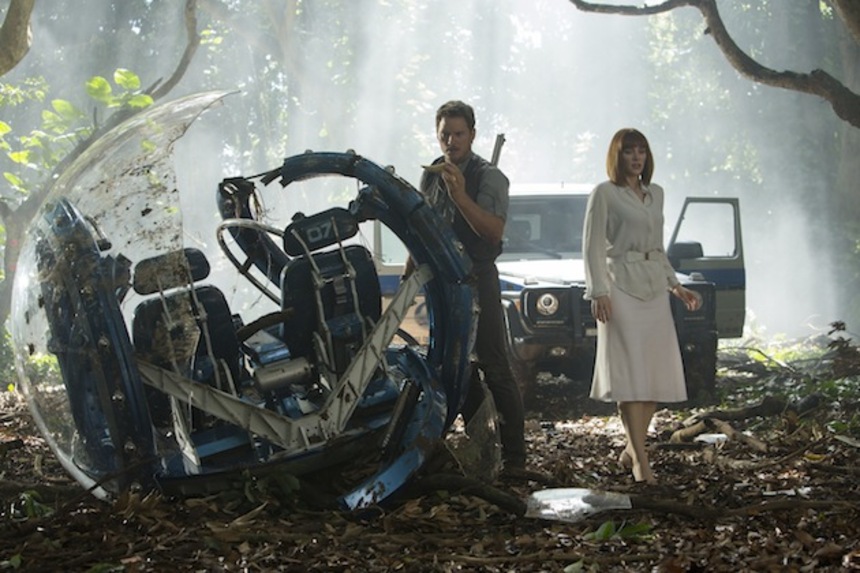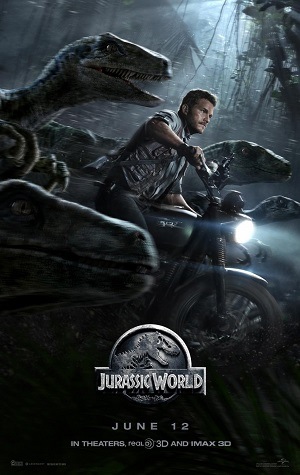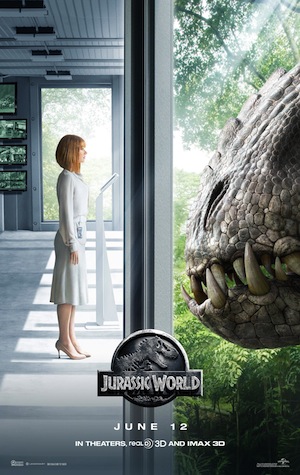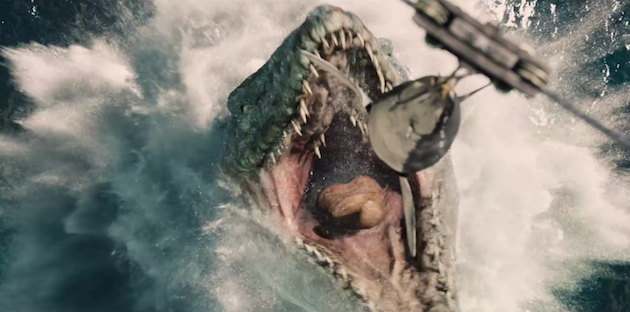Review: JURASSIC WORLD, When Brand(ed) Chaos Reigns

In the summer of 1993, I was 9 years old. Amidst my enthusiasm for Batman, X-Men, and all things Star Wars, I was compelled and fascinated by the world of dinosaurs. Every chance I got to do a report on a dino, I did it (mainly because I wanted to practice my drawing skills). The Macmillan Illustrated Encyclopedia of Dinosaurs and Prehistoric Animals was my bible. I was amongst those who dreamed what it would be like to see dinosaurs walk the earth again.
In the months leading up to Steven Spielberg's adaptation of Michael Crichton's bestselling book excitement was at a fever pitch. The decidedly adult novel, which presented a pseudo-scientific scenario where dinosaurs were brought back to life by DNA samples and genetic splicing, was turning into a family-friendly blockbuster by the godfather of summer popcorn flicks.
Before the release of the movie, a brand had already been born. But this was not because of the merchandising machine, which was indeed in full, inescapable effect that spring with toys and tie-ins galore. This was because one of our most cherished childhood dreams was going to be realized on the big screen like never before.
That September, I turned 10. A child far more fascinated with pictures rather than words, I had only begun learning to read in earnest at about 8. Still crackling with the dynamic thrills of Spielberg's blockbuster nee playing-god hypothesis, I vowed to read Crichton's novel. The undertaking was momentous. It would be my first adult book. Stumbling with considerable frustration during the pre-park chapters, it took me three months to finish it. As a frosty December rolled in, my life had been changed yet again. I was now a full fledged reader, and declared for the first time, perhaps a little triumphantly: "The book was better than the movie."
I'm sure many of you reading this article that are of a certain age have similarly wondrous and personal tales about the movie echoing in your heads right now. And yet it all gets back to our collective memory of that summer in 1993...
...Of that one rainy night on a tropical island. The water in a cup on the dashboard of a SUV, rippling with vibration. Our hearts pounding in unison, in anticipation. The flashlight out the window. That distant roar. Then the eye, yellow and wild... hungry... right there on the other side of the glass. It was the moment when the fine line between excitement and fear all but vanished, and we were left in primal awe and wonder.
Was it in this moment then that we began to grow up? Was it in this movie -- made by the man who ushered in the age of the blockbuster nearly 20 years prior with Jaws -- that the very DNA of such big screen fables began to inextricably change? Cavernous spectacle began to be mistaken for pure wonder. While excitement was slowly but surely drowned out by a bludgeoning cacophony of CGI effects, because now we could finally do anything. Yet nothing in our adulthood could safely satisfy that primal cinematic lust once felt as a child. Not even our wildest technicolor dreams, which were all seemingly coming true, again and again, summer into winter, could bring this home.
As Jeff Goldblum's chaos theorist Ian Malcolm declares in a rather pivotal and foreshadowing moment in Jurassic Park: "Life finds a way." So it was that studios found a way. That money found a way. And blockbusters grew up. They grew bigger. They grew monstrous. They became machines, hybrids of all our childhood fantasies, morbidly blasted out as sonic booms, ever rote in spectacle, in execution. Voices without souls. The formula wasn't broken. It didn't die. It became stagnant, its body disparate and bloated.
And so here we are, 22 summers on. After two rarely discussed sequels, the last of which arrived fourteen years ago, a new Jurassic Park film is being released in the digital age of over saturation.
 Many have anticipated director Colin Trevorrow's Jurassic World as a picture that would be dead on arrival. A gleaming, well-dressed corpse. Perhaps it was a cynically laced string of nostalgia that made some of us, myself included, mutter such things. Perhaps it was the notion that a director who had made just one small feature before this (Indie Spirit winner Safety Not Guaranteed), wouldn't be able to successfully take the reigns of a studio behemoth.
Many have anticipated director Colin Trevorrow's Jurassic World as a picture that would be dead on arrival. A gleaming, well-dressed corpse. Perhaps it was a cynically laced string of nostalgia that made some of us, myself included, mutter such things. Perhaps it was the notion that a director who had made just one small feature before this (Indie Spirit winner Safety Not Guaranteed), wouldn't be able to successfully take the reigns of a studio behemoth. And that marketing sure didn't help, either. We complained about the lackluster CGI in the trailers. We rolled our eyes at an early clip where Chris Pratt's and Bryce Dallas Howard's lead characters felt hopelessly drawn as broad sexist stereotypes from a bygone era. The park was finally open and seemingly no one wanted to go.
It is with more surprise than relief then that I can say Trevorrow's picture is the most relevant in the franchise since the original for several reasons, both fascinating and fun, of which I will unpack over the course of this review.
The conceit of the movie is deceptively simple and may seem asinine and horribly incestuous on first blush: Take the formula of the original film with dinos on the loose, but have it happen in a fully functioning, totally overcrowded mega-theme park.
Jurassic World is by no means a revelation, but like J.J. Abrams' Super 8, it revels in that particularly keen approach to adventure that Spielberg and Amblin Entertainment ushered in during the 1980s, also echoing many of those films' themes of familial strife and bonding.
Having said that, I will never be able to fully see this movie from the eyes of my childhood. The thrill is different now. And that's okay because what Trevorrow and co-writer Derek Connolly have done here is actually a mighty interesting thing. Yes, the film is fun, and I sure hope kids will experience a pure thrill from it. But what we have in Jurassic World that gets me truly excited is that Trevorrow has created a meta-modernist blockbuster.
You see, the movie is acutely aware of itself, and is thus, its own greatest critic. By its very plotting, structure and action does it thrust itself along the very notions of why it needs to exist in the first place. Indominus Rex, the genetic mutant dinosaur which breaks out to terrorize the park, is an avatar for many current blockbusters and the cancerous profit-driven momentum behind them. It is monstrously overgrown, a kitchen-sink dinosaur made to appease share holders and raise the park's revenue. As inGen's senior geneticist Henry Wu (BD Wong) tells Masrani (Irrfan Khan), when discussing the mutant dino with the president of Jurassic World's parent companies: "You wanted this. Your exact words were 'Make it... Bigger. Stronger. Cooler.'"
Trevorrow approaches this metatext with nary an ounce of cynicism, truly relishing in the sweet irony of making a corporate movie about the raging hubris of big corporate entertainment. He enthusiastically wants to find the wonder in big budget moviemaking again, and to do so must make a blockbuster that alleviates, reigns in, and ultimately must purge itself of... exactly what it is and what it doesn't want to be, all while being an entertaining experience.
It's a balancing that doesn't always work, and probably ends in mid-purge, but Jurassic World remains an active, vibrant dialog about where we go to from the current bloated state of studio tentpoles. Part of this means continually looking back at what the inherent creative value of the original film is. Because Jurassic World, on title alone, is indeed bigger than the first. But is it stronger? And is it cooler?
From having characters find shelter and resources in the abandoned visitor's center of the first park, to a bold remix of the climax from Spielberg's film that had my audience cheering with delight, there's a lot of intentional mirroring and refracting of the original here. Some viewers may frown on this, seeing it as the film attempting to gain goodwill on nostalgia aline. I see it as a necessary and healthy part of Trevorrow's attempt in purging the very thing he's making, while also subverting, and ultimately saying, with John Williams' iconic theme firmly triumphant: Yes, the purity of the original will always reign supreme in our heart of hearts. But lets have some fun in the meantime, and be smart about it and say something to boot.
A sly satirical bent further flows from this commentary on the megalomania and tyranny of the multiplex and into a winking look at the presence of branding and corporations in our daily lives. When Jake Johnson's control room operator Lowry, a perfect stand-in for JP fandom itself, hears that Verizon will be sponsoring Indominus Rex, his pithy response is why don't we just name the dinos after the companies... just like all the sports arenas. Product placement is rampant in the movie. From Pratt's macho raptor trainer Owen guzzling down a Coca-Cola, with the bottle's logo comically front and center in the frame, to a Starbucks on the island, the almost fascist state of consumerism present in the picture is another delicious exaggeration.
This further notion of branding stems into one of the movie's major themes about animal enslavement and animal rights. A flash from childhood and one might recall the Jurassic Park dinosaur toys that had JP stamped on the sides of their legs or torsos. The movie contextualizes this by asking if anyone can truly own these animals.
 Bryce Dallas Howard's Claire is a top administrator at Jurassic World. She is focused solely on the park's overhead and performance issues. She does not consider these dinosaurs to be living, breathing creatures. To her they are all assets for profit. Small details like the baby triceratops rides illustrate her viewpoint, and the company's, wonderfully. It is only when Indominus Rex breaks out and becomes a threat to her visiting nephews Gray and Zach (Ty Simpkins and Nick Robinson, respectively), whom she has neglected up to this point, that she then begins to see the nuances of life, and especially her own, in the bigger picture at play.
Bryce Dallas Howard's Claire is a top administrator at Jurassic World. She is focused solely on the park's overhead and performance issues. She does not consider these dinosaurs to be living, breathing creatures. To her they are all assets for profit. Small details like the baby triceratops rides illustrate her viewpoint, and the company's, wonderfully. It is only when Indominus Rex breaks out and becomes a threat to her visiting nephews Gray and Zach (Ty Simpkins and Nick Robinson, respectively), whom she has neglected up to this point, that she then begins to see the nuances of life, and especially her own, in the bigger picture at play. Despite what marketing would have you believe, Claire is the protagonist of the movie with her journey from corporatized person-hood back to a vibrantly living, breathing human being humming at its core.
We then have Pratt's Owen, a ex-navy man who has been hired by inGen's private military wing to test the intelligence of the velociraptors. From the word go, Owen's bond with the raptors is built on mutual trust and respect, not on manipulation or fear. Meanwhile, Vincent D'Onofrio's grotesque and porkish Hoskins, the head military man, is our clear cut villain. He sees the raptors as the first step to creating living weapons of war. If the original film dealt with the attempt to harness and dominate nature, only to then escape from its grasp and just let it be, Jurassic World is about resonating with the fact that we are a part of that natural world, no matter how disparate we have become from it.
Now let's be honest, we don't really come to a Jurassic Park movie for the human characters. Jeff Goldblum is arguably the only memorable person in the entire franchise, mainly because he's Jeff Goldblum.
But the cast here is able, with Trevorrow and Connolly writing an ensemble piece that may start out with archetypical gender roles, but as the action rolls along, begins to open up considerably. While Claire may come off as an uptight pencil pusher in her initial scenes, a sure concern for any feminist in the crowd, she is a resourceful person, finding a balance in power and kindness over the course of the film, and saving Owen's life on multiple occasions. Their relationship is an attempted throwback to that of Indy and Marion, or Han and Leia, or further back to the days of true screwball comedy ala Hepburn and Grant. This part of the movie isn't a home run, in large measure due to Pratt and Howard's limited chemistry, but amidst the cacophony it proves far more harmless than first thought.
The dino side of things is a mixed bag, which is largely due to the CG work. Indominus Rex is treated as a great white phantom, coming and going with a force that is hard to pin down. When the CG version of the creature does appear face to face with our heroes it rarely feels like a threat. There's that uncanny distance between people and dino, real and animated, that saps the tension out of a scene. It is only in the moments when we stay close to our characters, and we get a practical effects puppet, or mix of both practical and computer, that we hold our collective breath. Luckily, there are a few such moments.
On the other hand, Owen's relationship with the raptors, which are mostly CG animated this time out, works fine. The intimacy he has with these animals is palpable, like a man living with a pack of wolves, and makes the climax all the more emotionally resonant. Perhaps it's merely the size of the creatures that causes this rift in VFX effectiveness. Or perhaps it's what they subtextually stand for...
Clever metatext aside (because no film fan will miss the bit where Jaws is fed to a massive aquatic dino as a mere afternoon snack), Trevorrow proves himself a totally capable director of adventure and thrills. There's nothing wonderfully original about any of the action here, but it is always fun, tastefully grotesque when need be, and easy to follow. My biggest issue outside of some of the effects work is that much of the action takes place in broad daylight, which I felt at times neutered the movie's tension. There's something truly terrifying when our fears come out in the dark. Which was something the original film took to heart. Still, there's something exceptionally delicious about an army of winged dinos assaulting a resort of prattling, sun-stroked tourists.
So, did Jurassic World have any right to work? Because many of us certainly didn't expect it to. And did we as an audience have any right to prematurely judge it? Either way, the film was going to get made by the sheer Napoleonic thrust of the studio hive mind. So thank the movie gods (IE Spielberg?) that we had someone like Trevorrow come along to navigate and balance out the process with aplomb.
Looking at the movie as a satirical sendup of corporate greed running amok makes it an intellectual hoot, while seeing it as a throwback to Amblin flicks where kids can find themselves thrust into tangible life and death danger also works. It won't be a summer classic, but in this day and age of the often overstuffed, rote blockbuster, Jurassic World is a near unmitigated success for its efficient and intelligent sense of how to have fun at the movies. Like its adult counterpart Mad Max: Fury Road, it is a work that takes a genuine look back so as to move forward, corporate body, artistic soul and all.
At the very least, you'll find yourself whistling John Williams' classic theme all day long -- How's that for some insidious brand marketing built straight from your childhood?


Do you feel this content is inappropriate or infringes upon your rights? Click here to report it, or see our DMCA policy.






